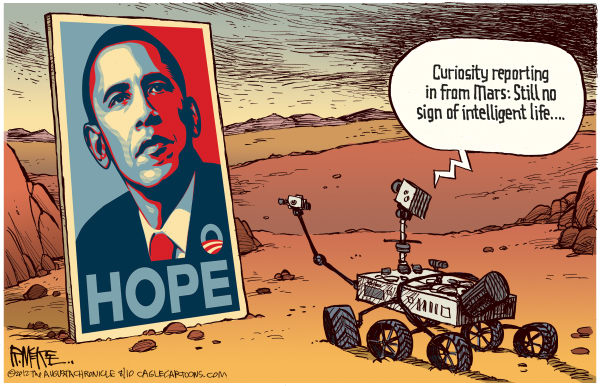
Fasten your seat belts, or rather Orion's belt. That's the name used for the three stars that may be the most prominent feature of the constellation Orion in the night sky. Orion also appeared in headlines across the country and around the world the other day when an American spacecraft by that name ventured farther from Mother Earth than any other made for human flight since the golden age of space exploration decades ago. It was a reminder that America -- and man -- isn't finished exploring yet.
Not since Apollo 17 in 1972 has the American space program broken free of the surly bonds of near-Earth orbit. Not with a vehicle designed to carry that remarkable species of lab animal -- Homo sapiens -- ever deeper into space. And more impressive, return safely to this blue dream of a planet, and Orion went 15 times as far: 3,600 miles up.
Orion is just the beginning: A space flight with astronauts aboard is to take off as early as 2021, unless the usual naysayers get their way. And they'll have plenty to say, as they always do when a space shoot goes tragically wrong, or even when it doesn't. You can count on the prophets of doom to supply a whole litany of complaints about such voyages: They cost too much. They consume funds that could be better used at home. They are dangerous and uncertain in general, if not positively crazy ... and so pessimistically on.
The list of objections hasn't changed all that much since the learned astronomers and numbers-crunchers at Ferdinand and Isabella's court advised against wasting all those ducats on some harebrained scheme of an eccentric Italian adventurer of unclear origins who proposed getting to the East by sailing straight West, of all unlikely directions. Talk about sheer madness. And yet today, those living in this
Of all the perfectly sensible objections to such voyages, or at least they can seem perfectly sensible at the time, the one that renders all of them only abstract is human nature. Our species has been called Man the Voyager, and he will not be discouraged. Not as long as man is man. And sails on. Though not without detours, delays, and uncountable disappointments. A recent example: If only
But the country is waking up at last -- to dream again. A monster rocket (the SLS) is to lift American astronauts to new heights in the coming years. It's already on the drawing boards.
It was only to be expected that, as an old man, I would be watching as man's curiosity triumphed again, or rather the Mars rover Curiosity did. I should have hit the sack hours before but, turning on the TV to catch the latest news in the middle of the night, there Curiosity was -- descending, second by suspenseful second, onto the surface of Mars, no longer a fabled planet but new ground under our feet.
Of course it would happen in the dark, at least according to our slice of Earth time called Central Daylight, just as I had watched many a Mars landing inside the cool dark of the old
I have a Mars rover of my own. About an inch long, the tiny magnetized thing explores only my refrigerator door, but it still gets almost to the top when I twist the little knob on it. Its six-wheeled, real-life counterpart made it all the way to a crater on your friendly neighborhood red planet, housing more scientific equipment than my whole college chemistry lab did. Now it's waiting to record the next Martian chronicle,
The little signals from Mars in the middle of that dark night (ping ... ping ... ping) announced that man had arrived on another once distant shore. There was a kind of deathless music to them.
Comment by clicking here.
Paul Greenberg is the Pulitzer-winning editorial page editor of the Arkansas Democrat-Gazette.



 Contact The Editor
Contact The Editor
 Articles By This Author
Articles By This Author